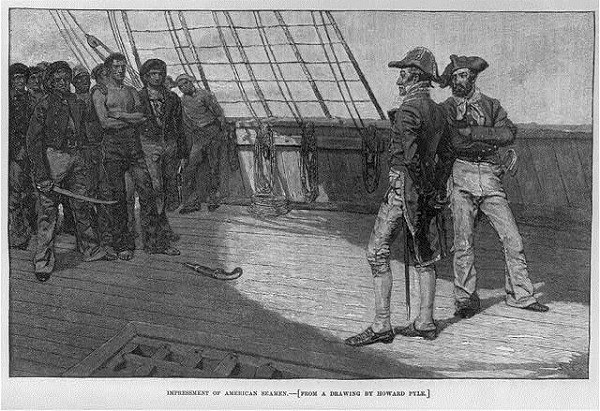Last updated: September 21, 2023
Article
Impressment and the War of 1812
“Without a press, I have no idea how our Fleet can be manned.” —British Admiral Lord Horatio Nelson

Library of Congress
A primary cause of the 1812 war between Britain and the U.S. was the British practice of boarding American merchant ships in search of deserters from the Royal Navy. Americans claimed that the British were none too careful about who they removed from the boarded vessels, and that free sailors were impressed into British service along with deserters.
Britain’s insistence on pressing sailors into naval service sprang in part from its wars against Napoleon. The number of seaman needed to crew British ships nearly tripled between 1793 and 1812, from 36,000 to 114,000. At the same time, the life of a Royal Navy sailor became steadily more brutal. Facing harsher discipline and more dangerous conditions, as many as 100,000 Royal Navy service members died during that twenty-year period.
Because voluntary enlistments could never satisfy the demand for sailors, the British resorted to the use of press gangs to forcibly place men into service. As many as half of all seamen manning the Royal Navy were impressed. About 10,000 Americans found themselves impressed into service during the Napoleonic Wars. The British argued that the sailors it impressed had escaped from their navy. When Americans protested against the seizures, British authorities justified their practice by arguing that being a British subject took precedence over claims of American citizenship.
In the months before the war, Americans interpreted the ongoing British practice of stopping American merchant vessels as implying that the United States was not an equal in international relations. Such an insinuation was vexing for Americans, as it seemed to discount their victory over Britain in the Revolution. The series of hostile exchanges on the high seas between Great Britain and its former recalcitrant colony led some to view the War of 1812 as a “second American Revolution.”
In the end, three years of warfare did nothing to settle one of the main causes of the war. Britain refused to yield on impressment. In fact, the U.S. peace commissioners at Ghent never even raised the issue of impressment, nor was it mentioned in the final treaty itself.
